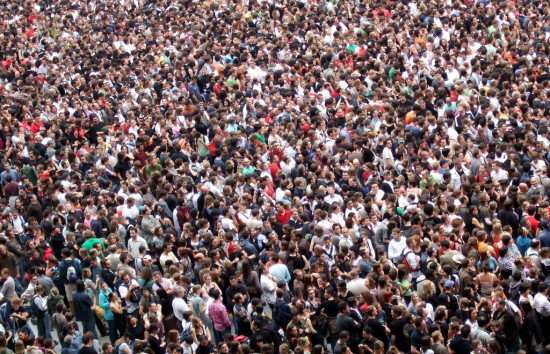Tens of Thousands

Exaggeration
When it comes to exaggeration, anything goes as long as the number is far from representing any reality. It’s usually fairly obvious when someone is doing this because what they are saying is frankly impossible, or at least, unlikely. What they really mean is “a lot.” Although “thousands” and “millions” are more frequently used in exaggeration than “tens of thousands” or “hundreds of thousands,” there’s nothing to stop people from getting creative when indulging in the art of exaggeration!
Vague Real Numbers
Look carefully at the phrase “tens of thousands.” The word “tens” is pluralized, so just 10,000 would be too few. You need several sets of ten to make up “tens.” We have now successfully eliminated all numbers from 10,000 to 19,999. As soon as we hit the 20,000 mark, we now have more than one set of ten, so we can use the plural form. This holds true all the way up to 99,999, although, by the time you get to the upper limit “almost a hundred thousand,” though still vague, gives a better indication of just how big the numbers are.
Vague Hundreds of Thousands
Now that we’ve looked at “tens of thousands,” you could probably write this paragraph for me, but in case I lost you first time round, let’s take it from the top. “Hundreds” means more than one set of a hundred, so you can’t speak of hundreds of thousands of anything without exaggerating until you get to the two hundred thousand level. You can carry on talking about hundreds of thousands until the number under discussion reaches one million, but most people would point out that anything over 900,000 is getting close to a million.
Why Be Vague About Numbers?
There are actually several reasons to be unclear about numbers:
- You don’t know what the number is, and you’re guessing.
- You have some idea of the number, but there could be more or less than that.
- You’re using these expressions for effect and know you may be exaggerating.
- You aren’t exaggerating, but you either don’t have, or couldn’t be bothered with, exact numbers.
- The exact numbers aren’t really important.
How About Some Examples?
People have been making fires using this method for hundreds of thousands of years.
Modern humans are said to have evolved about 200,000 years ago, so it’s not incorrect to use “hundreds of thousands.” Besides, the exact number here isn’t really important. What you are saying is that people have used a certain method to make fires for a very, very long time.
If you do my writing challenge, you’ll write tens of thousands of words this year.
Again, the exact number really isn’t an issue in this statement. I just want people to know that they can write a lot of words using a simple challenge. If the person is interested in knowing more after reading this statement, they can look to see the exact number is 66,795 words.
There must be hundreds of thousands of bacteria living on that decaying food!
Here’s a statement that’s sheer guesswork. You have absolutely no idea how many bacteria are living on the food, but by the look of it, there must be plenty.
Judging from the poll, there are tens of thousands of people who agree with me.
There was a number. It was big. You can’t really remember it, and you can’t be bothered to get the exact figure. Was it 30,000, or was it 50,000? You’re not really sure.
With how many tens of thousands of grains of salt should you take vague number statements?
To put it differently, can you take people seriously when they use vague numbers? I think the best bet is to believe that they mean “a lot” and judging by the context, you should be able to get some idea of whether their “tens” or “hundreds” of thousands really do fall into the numerical range suggested by the phrases.
All the same, you can’t take numbers like that too seriously. They’re just too broad, and they can too easily be used to make exaggerated claims. When in doubt, find out. That’s what Google is for.
(Photo courtesy of James Cridland)


I think it’s rather apparent what tens of thousands means. It means exactly what it says. It isn’t that difficult to understand.
Yes, in a general sense you are correct, but tens of thousands is such a broad amount that they can be quite confusing. There’s a huge difference between 20,000 and 90,000 just like there’s a huge difference between 2 million and 9 million.
Here’s the issue I have with numbers like this. They don’t really mean anything. Basically, you’re saying “a really big number” so if you wouldn’t put that in a sentence, then you shouldn’t use tens of thousands, hundreds of thousands, tens of millions, hundreds of millions or any other number like that.
Saying “there were tens of thousands of people at the game” is no different than saying “there were a really big number of people at the game”
I don’t think this is correct. Sure, it’s not an exact number, but it gives a general idea of the crowd. There is a mental difference between dozens at the game, hundreds at the game, thousands at the game and tens of thousands at the game. While none of those numbers is specific, you can create an mental image of how many people are at the game with each one, and each will be different.